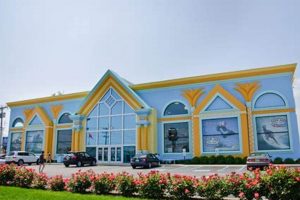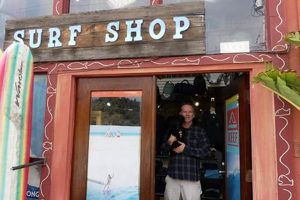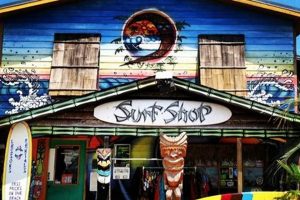An establishment in a coastal town provides equipment, apparel, and services related to wave-riding activities. Such businesses typically offer items such as surfboards, wetsuits, rash guards, and related accessories for purchase or rent. Lessons and advice regarding local wave conditions are also frequently available.
These coastal businesses play a vital role in the local economy by catering to tourists and residents interested in water sports. Their presence supports ancillary industries, including tourism, hospitality, and related retail sectors. Historically, they have served as hubs for the surfing community, fostering a culture of ocean appreciation and promoting water safety.
The following sections will delve into specific aspects, including the types of products offered, the importance of skilled personnel, and the role of these businesses in promoting environmental awareness within the coastal community.
Expert Advice for Ocean Activities
Optimizing experiences in coastal environments requires careful consideration of several factors. Adhering to the following guidelines can enhance safety and enjoyment.
Tip 1: Equipment Assessment: Prior to engaging in wave-riding activities, ensure the appropriate selection and maintenance of equipment. Surfboards should be free of damage, and leashes should be in good working order. Wetsuits must fit properly to provide adequate thermal protection.
Tip 2: Awareness of Conditions: Before entering the water, scrutinize prevailing wave conditions, tides, and currents. Heed posted warnings and consult with experienced individuals regarding potential hazards.
Tip 3: Proper Attire: Employ appropriate sun protection measures, including sunscreen with a high SPF rating and protective clothing. This minimizes the risk of sunburn and long-term skin damage.
Tip 4: Skill Evaluation: Honestly assess personal skill level and avoid attempting maneuvers beyond capabilities. Beginner wave-riders should opt for gentler conditions and seek instruction from qualified instructors.
Tip 5: Adherence to Local Regulations: Familiarize oneself with and abide by all local ordinances and regulations pertaining to water activities. These rules are designed to ensure safety and minimize conflicts with other beach users.
Tip 6: Respect for the Marine Environment: Refrain from littering and practice responsible stewardship of the coastal environment. Dispose of waste properly and avoid disturbing marine life.
Tip 7: Hydration and Nutrition: Maintain adequate hydration levels by consuming sufficient fluids, especially during prolonged activity. Choose nutritious snacks to sustain energy levels.
Implementing these recommendations promotes responsible engagement with the ocean environment and contributes to a safer, more enjoyable experience.
The subsequent sections will focus on further exploration of coastal safety and best practices for preserving the marine ecosystem.
1. Retail Sales
Retail sales constitute a primary revenue stream for establishments specializing in wave-riding activities. The availability of equipment for purchase is critical to enabling participation in the sport. These sales directly influence the business’s profitability and sustainability within the competitive marketplace. For example, the sale of a surfboard not only generates immediate revenue but also fosters customer loyalty, potentially leading to future purchases of accessories or services. The absence of a robust retail sales component would significantly impair the business’s ability to serve the needs of its clientele and maintain financial viability.
The range of items offered through retail sales caters to diverse skill levels and preferences. Beginner wave-riders may purchase entry-level boards and essential accessories such as leashes and wax. Experienced surfers often seek high-performance equipment tailored to specific wave conditions or riding styles. The selection of apparel, including wetsuits and rash guards, addresses the need for thermal protection and sun protection. Effective inventory management and knowledgeable sales staff are crucial for optimizing retail sales performance and meeting customer expectations. Furthermore, seasonal fluctuations in demand necessitate strategic planning to ensure adequate stock levels throughout the year.
In summary, retail sales are an indispensable component of a coastal business, directly impacting its financial health and ability to serve the wave-riding community. Effective management of inventory, knowledgeable staff, and a diverse product range are key factors in maximizing the contribution of retail sales to the overall success of the enterprise. The correlation between retail sales performance and overall business sustainability highlights the importance of this function.
2. Rental Services
The provision of rental services is a significant component of businesses catering to wave-riding enthusiasts. These services enable access to equipment without requiring a substantial upfront investment, fostering participation from tourists, beginners, and those who engage in the activity infrequently. The presence of a rental program broadens the appeal of the business and generates a consistent revenue stream, particularly during peak tourist seasons. A coastal town establishment that offers surfboard rentals, for instance, facilitates participation for visitors who are unable to transport their own equipment. This directly contributes to the local tourism economy while also serving as an entry point for individuals interested in learning to surf.
The quality and maintenance of rental equipment are paramount to ensuring customer satisfaction and safety. Well-maintained surfboards, properly sized wetsuits, and reliable accessories enhance the overall experience and mitigate potential risks. Regularly inspecting and repairing rental items is essential for preventing equipment failure and minimizing the likelihood of injuries. Moreover, providing guidance on the proper use of rental equipment promotes responsible engagement with the ocean environment and reinforces the business’s commitment to safety. The availability of different surfboard sizes and styles allows renters to choose equipment appropriate for their skill level and the prevailing wave conditions.
In conclusion, rental services are an integral aspect of a retail location, contributing to its accessibility, revenue generation, and overall appeal. The success of a rental program depends on maintaining high-quality equipment, prioritizing customer safety, and providing knowledgeable assistance. Recognizing the importance of rental services allows for a more comprehensive understanding of the business’s role in promoting water sports and fostering a vibrant coastal community.
3. Lessons Offered
The provision of instructional programs is intrinsically linked to businesses specializing in wave-riding activities. These programs facilitate the introduction of new participants to the sport, promote skill development, and contribute to water safety awareness. The availability of lessons offered directly enhances the business’s value proposition and fosters a sense of community engagement.
- Introduction to Water Safety
Instructional programs emphasize fundamental water safety practices, including identifying rip currents, understanding wave dynamics, and employing appropriate rescue techniques. These lessons equip participants with the knowledge necessary to navigate the ocean environment safely and responsibly. For example, a beginning surfer might learn how to properly fall off a board to avoid injury or how to signal for help in case of an emergency. These skills are applicable beyond surfing and contribute to overall ocean awareness.
- Technique Development
Lessons provide structured guidance on paddling, popping up, riding waves, and performing basic maneuvers. Qualified instructors offer personalized feedback and tailored drills to improve technique and build confidence. A student learning to surf, for example, would receive instruction on proper stance, weight distribution, and timing to effectively catch and ride a wave. Consistent practice under the supervision of an experienced instructor accelerates skill development and reduces the risk of forming bad habits.
- Equipment Familiarization
Instructional programs incorporate education on the proper selection, use, and maintenance of wave-riding equipment. Participants learn about different types of surfboards, wetsuits, leashes, and other accessories, gaining the knowledge necessary to make informed purchasing decisions. For instance, a student might learn the differences between a longboard and a shortboard and how each is suited to different wave conditions and skill levels. Understanding equipment characteristics enhances performance and extends the lifespan of the gear.
- Promoting Ocean Stewardship
Lessons often integrate principles of environmental conservation and responsible ocean stewardship. Participants learn about the importance of protecting marine ecosystems, minimizing waste, and respecting wildlife. An instructor, for example, might emphasize the impact of pollution on coral reefs and encourage students to participate in beach cleanups. Fostering a sense of environmental responsibility contributes to the long-term sustainability of wave-riding activities.
In summary, the lessons offered are vital to fostering a safe and sustainable surfing culture. They directly support businesses by attracting new customers and enhancing their reputation. The integration of safety, technique, equipment knowledge, and environmental stewardship within instructional programs creates a comprehensive learning experience that benefits both individuals and the coastal community.
4. Community Hub
Businesses frequently function as focal points for local communities, providing more than just retail or service offerings. Establishments serving specific interests, such as wave-riding, often become central gathering places for individuals sharing that passion. The role of such an enterprise as a community hub merits examination.
- Social Interaction
These establishments provide opportunities for individuals to connect with like-minded people. Customers may congregate to discuss recent wave conditions, equipment preferences, or upcoming events. This interaction fosters camaraderie and strengthens the sense of belonging within the wave-riding community. Regular customers form relationships with staff and other patrons, creating a social network centered around their shared interest.
- Information Exchange
A business often serves as a repository of local knowledge regarding optimal locations, wave forecasts, and safety considerations. Experienced wave-riders may share their insights with beginners, promoting safer practices and enhancing the overall experience. Staff members typically possess extensive knowledge of local conditions and can provide valuable advice to customers.
- Event Coordination
The business may organize or sponsor community events, such as surf competitions, beach cleanups, or film screenings. These events provide opportunities for individuals to participate in activities beyond simply purchasing goods or services. Community involvement through events reinforces the business’s commitment to the local area and strengthens its relationship with its customer base.
- Mentorship and Skill Development
These establishments can facilitate mentorship relationships between experienced wave-riders and those new to the sport. Instructors may offer advanced lessons or guidance to aspiring professionals, helping them develop their skills and pursue their goals. The business provides a supportive environment for individuals to learn and grow within the wave-riding community.
The presence of these multifaceted retail locations extends beyond simple transactions; such business become vital components of a community’s social fabric. It is a locus for both the transfer of skill and the building of long lasting bonds.
5. Local Knowledge
A retail establishment specializing in wave-riding activities within a coastal environment benefits significantly from the integration of local knowledge. Such knowledge encompasses an understanding of prevailing wave patterns, tide fluctuations, potential hazards (such as rip currents or submerged obstacles), and optimal locations for wave-riding based on skill level and weather conditions. The dissemination of this information is crucial for enhancing safety, maximizing enjoyment, and fostering responsible engagement with the marine environment. For instance, staff might advise customers on the best time of day to surf based on tide conditions, or warn them of specific areas where rip currents are prevalent, effectively mitigating potential risks.
The absence of local knowledge within such an establishment can lead to several negative consequences. Customers may unknowingly venture into hazardous conditions, increasing the likelihood of accidents or injuries. A lack of awareness regarding wave patterns could result in a suboptimal experience, diminishing the customer’s satisfaction and potentially impacting the business’s reputation. Conversely, a business that actively promotes and shares local knowledge cultivates trust with its clientele, establishing itself as a reliable and valuable resource within the community. Regularly updated information on surf reports, weather forecasts, and coastal alerts further reinforces this credibility.
In summary, local knowledge is an indispensable component of a successful business. Its integration enhances safety, improves customer experiences, and strengthens the business’s position within the coastal community. By prioritizing the acquisition and dissemination of local knowledge, establishments demonstrate a commitment to both customer well-being and responsible stewardship of the marine environment. The failure to adequately incorporate this element can undermine the business’s viability and potentially endanger its clientele.
Frequently Asked Questions
The following section addresses common inquiries regarding services, equipment, and safety considerations relevant to coastal wave-riding activities.
Question 1: What types of surfboards are available for rent?
A range of surfboards is offered, including longboards, shortboards, and beginner-friendly soft-top boards. Selection depends on individual skill level and prevailing wave conditions. Consult with staff for guidance on choosing an appropriate board.
Question 2: Are surf lessons provided?
Yes, instructional programs are available for individuals of all skill levels. Lessons cover fundamental techniques, water safety practices, and equipment familiarization. Group and private sessions are offered.
Question 3: What safety precautions should be observed while wave-riding?
Prior to entering the water, assess wave conditions, tides, and currents. Be aware of potential hazards, such as rip currents or submerged obstacles. Wear appropriate attire, including sunscreen and a properly fitted wetsuit. Adhere to all local regulations and guidelines.
Question 4: Is equipment insurance available?
Damage waivers may be offered for rented equipment. Inquire about specific terms and conditions at the time of rental. Patrons are responsible for equipment loss or damage exceeding the coverage provided by the waiver.
Question 5: What are the business hours?
Operating hours vary seasonally. Consult the business’s website or contact directly for current hours of operation.
Question 6: Are there any age restrictions for participating in surf lessons or equipment rentals?
Age restrictions may apply to certain activities. Parental consent may be required for minors. Contact the business for detailed information regarding age-related policies.
This information provides a foundational understanding of key aspects related to engaging in wave-riding activities. Additional inquiries can be directed to the appropriate personnel.
The subsequent section will explore advanced techniques and strategies for maximizing performance in coastal environments.
Bethany Beach Surf Shop
This discourse has examined critical elements associated with Bethany Beach Surf Shop operations. The importance of retail sales, rental services, instructional programs, community engagement, and the application of local knowledge were detailed. Each facet contributes uniquely to the establishment’s functionality and its role within the coastal ecosystem.
The continued success of Bethany Beach Surf Shop, and similar entities, necessitates an unwavering commitment to customer safety, environmental stewardship, and the provision of high-quality services. Future prospects hinge upon adapting to evolving market trends, embracing sustainable practices, and fostering a knowledgeable and engaged community of wave-riding enthusiasts.



![Shop Ono Surf Shop: Gear & More | [Location] Learn to Surf & Skate: A Beginner's Step-by-Step Guide Shop Ono Surf Shop: Gear & More | [Location] | Learn to Surf & Skate: A Beginner's Step-by-Step Guide](https://universitysurfandskate.com/wp-content/uploads/2026/01/th-858-300x200.jpg)



